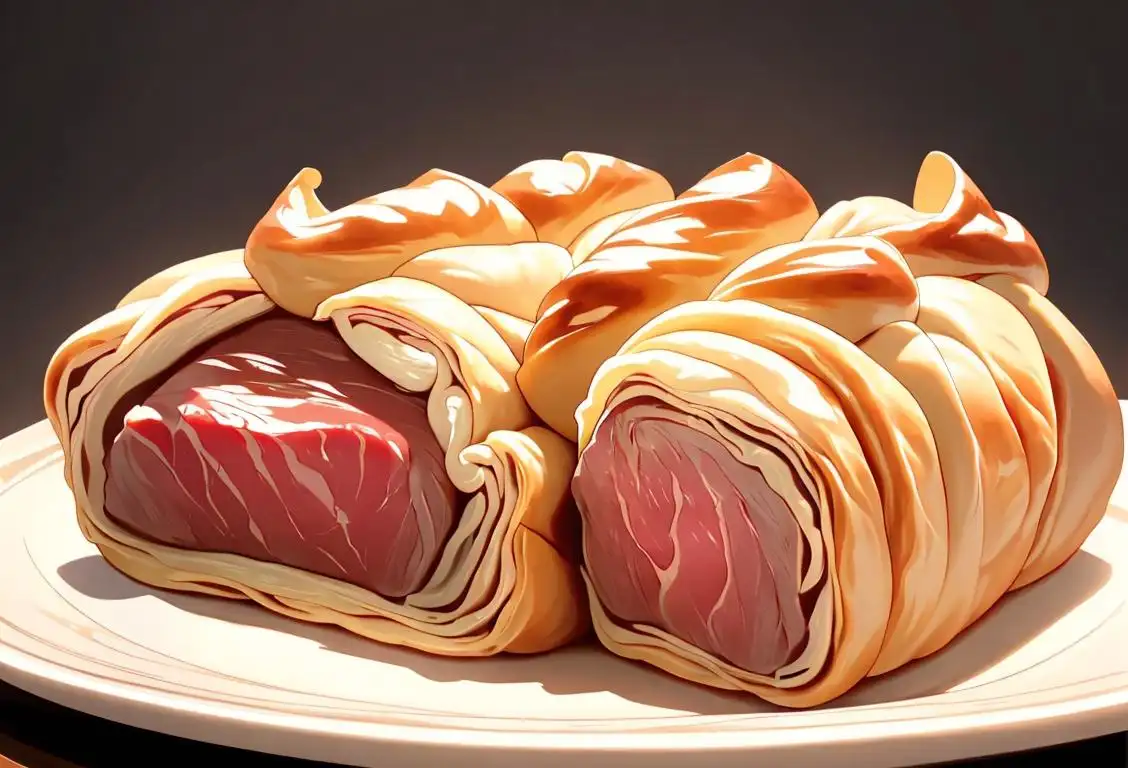National Beef Wellington Day

Welcome to the whimsical world of National Beef Wellington Day! Prepare to embark on a culinary adventure that will have your taste buds dancing and your stomach growling. Get ready to learn about the history of this delicious dish and why it deserves a whole day of celebration. So grab your forks and let's dig in!
When is Beef Wellington Day?
It's national beef wellington day on the 6th April.
A Brief History of Beef Wellington
Beef Wellington, a delectable delicacy made of tender beef fillet, savory pâté, and crispy puff pastry, has a history as rich as its flavors. Let's travel back in time to explore the origins of this mouthwatering masterpiece.
Although its name might suggest a British origin, the exact history of Beef Wellington is up for debate. Some believe it was named after Arthur Wellesley, the 1st Duke of Wellington, who led the British army to victory against Napoleon at the Battle of Waterloo. Others claim that it was created by the famous French chef Marie-Antoine Carême, who served the dish to the Duke during a banquet.
No matter its true origin, Beef Wellington quickly became a beloved dish fit for royalty. Its elegant presentation and complex flavors made it a staple at grand dinners and special occasions.
Celebrating National Beef Wellington Day
On National Beef Wellington Day, food enthusiasts and culinary adventurers from around the world come together to celebrate this iconic dish. Whether you decide to try your hand at making your own Beef Wellington or opt for dining out at a fancy restaurant, the key is to savor each bite and enjoy the indulgence.
Make it a festive affair by gathering your loved ones and indulging in this decadent delight. Why not host a Beef Wellington cooking competition with friends or challenge your significant other to a bake-off? The possibilities are endless, and the aroma of seared beef and buttery pastry will surely create an unforgettable experience for all.
A Wholesome Fact: Beef Wellington and Love
Did you know that Beef Wellington has a long-standing association with romance? Many couples choose to celebrate their love by preparing this dish together. It's a labor of love that involves teamwork, patience, and, of course, a hearty appetite. So, if you're looking for a creative and delicious way to express your affection, Beef Wellington might just be the recipe for romance.
History behind the term 'Beef Wellington'
19th century
The Rise of Beef Wellington
Beef Wellington originated in the United Kingdom during the 19th century. It is believed to have been named after Arthur Wellesley, the first Duke of Wellington, who served as the British Prime Minister and was renowned for his military successes. Despite the name, there is no clear evidence linking the dish directly to the Duke himself.
1815
The Duke of Wellington's victory in the Battle of Waterloo
In 1815, the Duke of Wellington, Arthur Wellesley, emerged victorious in the Battle of Waterloo. This pivotal event marked the end of the Napoleonic Wars and solidified Wellington's status as a national hero in Britain.
20th century
The Creation of the Recipe
The exact origins of Beef Wellington as a specific recipe are uncertain. However, it gained popularity during the 20th century and became synonymous with elegant British cuisine. The dish traditionally consists of tender beef fillet coated in pâté and duxelles (a mixture of finely chopped mushrooms), then wrapped in puff pastry and baked until golden and crispy.
19th century
The rise of French cuisine in England
During the 19th century, French cuisine gained popularity and influence in England, especially among the upper-class society. French culinary techniques, ingredients, and dishes started making their way into British kitchens.
Early 20th century
The creation of beef wellington
The term 'beef wellington' is believed to have originated during the early 20th century. It is named after the Duke of Wellington as a culinary homage to his fame and military victories. The dish consists of a tender beef fillet coated with a layer of pâté, covered in a layer of duxelles (finely chopped mushrooms, onions, and herbs), and wrapped in puff pastry. It is then baked until the pastry turns golden and the meat remains cooked to perfection.
1970s
Beef Wellington Goes International
In the 1970s, Beef Wellington surged in popularity and began to appear on menus worldwide. Its reputation as a gourmet dish made it a favorite choice for special occasions and fine dining establishments. Additionally, celebrity chefs like Julia Child and Gordon Ramsay further popularized the dish, sparking a renewed interest in classic British cuisine.
Present
Beef Wellington's Enduring Legacy
Today, Beef Wellington remains a beloved classic. While the traditional recipe has been adapted and modified over the years, the essence of the dish remains intact. It continues to be a symbol of elegance and sophistication in the culinary world, capturing the imagination of food enthusiasts around the globe.
1960s
Increased popularity and association with fine dining
During the 1960s, beef wellington gained considerable popularity, particularly as a gourmet dish served in high-end restaurants. Its association with fine dining and special occasions contributed to its reputation as an indulgent and elegant meal.
Modern times
Celebrity chefs and variations
In modern times, beef wellington has become a signature dish for many celebrity chefs, popularized through cooking shows and culinary competitions. Chefs have brought their own variations to the traditional recipe, experimenting with different fillings, sauces, and presentations while still preserving the essence of the classic dish.
Did you know?
Beef Wellington holds strong symbolic meaning in the culinary world. It is often seen as a testament to the chef's skill and creativity, making it a popular dish in cooking competitions.Tagged
romance food loved onesFirst identified
6th April 2016Most mentioned on
6th April 2016Total mentions
4Other days
Awareness Day
Prayer Breakfast Day
One Day
Kissing Fried Chicken Day
Opposite Day
Vodka Boyfriend Day
Action Day
Happiness Day
Suicide Prevention Month Day
Family Day









